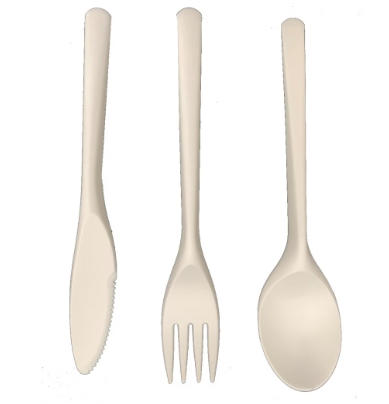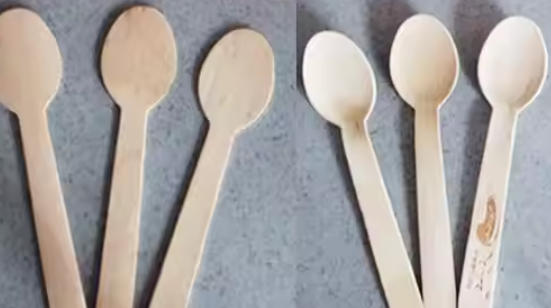
Content Menu
● Why the World Chooses China's Biodegradable Spoons Manufacturers
● Understanding Biodegradable Spoons: Leading Materials and Technologies
● The Manufacturing Journey: How Biodegradable Spoons Are Made
>> 1. Sourcing the Raw Material
>> 2. Preliminary Processing
>> 3. Shaping and Molding
>> 4. Smoothing, Finishing, and Quality Control
>> 5. Packaging and Export Logistics
● Top 10 Biodegradable Spoons Manufacturers in China
>> 1. Hebei Gurui Environmental Protection Packaging Products Co., Ltd.
>> 2. Singreen Packaging
>> 3. Suzhou Quanhua Biomaterial
>> 4. GP Materials Technology (Jiangsu)
>> 5. Ancheng (Fujian)
>> 6. Hunan Herun Bamboo
>> 7. Sontex (Shanghai)
>> 8. Huiang (Zhejiang)
>> 9. Huaihua Hengyu Bamboo Development Company
>> 10. Dexuan
● Bulk Production, Customization, and Global Export
● How Biodegradable Spoons Support Global Sustainability
● Industry Standards, Trends, and Regulatory Support
● Comparing the Top 10 Manufacturers
● Conclusion
● Frequently Asked Questions
>> 1. What certifications do Biodegradable Spoons Manufacturers in China provide?
>> 2. Are Chinese biodegradable spoons suitable for hot foods?
>> 3. How customizable are OEM/ODM biodegradable spoon orders from China?
>> 4. What is the minimum order quantity (MOQ) for custom or bulk orders?
>> 5. How long does it take for biodegradable spoons made in China to decompose?
● Citations:
With global awareness surging around plastic waste, the need for genuinely green, practical, and cost-effective cutlery alternatives is urgent. Biodegradable spoons from China have emerged as a preferred solution for restaurant groups, caterers, brand owners, food service chains, and eco-product wholesalers worldwide. Whether supplying supermarkets in Europe, North America, or emerging markets, the vast ecosystem of Chinese Biodegradable Spoons Manufacturers offers scale, innovation, customization, and reliability unmatched elsewhere.[3][11]
This comprehensive guide explores the leading ten manufacturers, their factory strengths, technological processes, approachable MOQs, policies, certifications, and OEM/ODM capabilities, as well as sustainability considerations and industry standards. It is designed to serve international importers, distributors, restaurant brands, and anyone seeking to build a robust biodegradable spoons supply chain direct from China.

Why the World Chooses China's Biodegradable Spoons Manufacturers
China's transformation into a dominant force in sustainable tableware is the product of multiple powerful forces:
- A national mandate phasing out non-degradable plastics by 2025, driving investment and innovation in compostable tableware.[3]
- A unique supplier base offering not only finished spoons but also the formulation, resin production, and industrial-scale molding to support branded, bulk, and retail-orders.
- Competitive pricing enabled by large-scale automated production facilities, making both small batch and high-volume procurement viable.
- OEM/ODM flexibility—from the ability to print custom logos, colors, and product designs to private packaging and marketing support.
- Global certifications: Most factories support exports by complying with ISO, FDA, EN13432, BSCI, FSC, SGS, and related international standards. This gives clients confidence in both food safety and compostability.[11][12]
Understanding Biodegradable Spoons: Leading Materials and Technologies
Biodegradable spoons produced in China typically fall into three primary material categories, each with unique sensory, environmental, and performance properties:
1. Plant Fiber (Bagasse, Bamboo, Wood Pulp):
- Derived from fast-renewable crops such as sugarcane, bamboo, or planted forests.
- Crafted via high-pressure pulping, molding, and heat/cold forming for robust, 100% petrochemical-free spoons.
- Naturally compostable and safe for all food uses.
2. CPLA/PLA Bioplastics:
- PLA (Polylactic Acid) is created from the fermentation of plant starch, typically corn or sugarcane. To increase heat resistance, it is processed into CPLA (Crystallized PLA).[5]
- Molded through advanced extrusion and injection machines into smooth, rigid spoons suitable for hot or cold food.
- Compostable under industrial conditions and certified for use in global markets.[13][5]
3. Bamboo or Wooden Spoons:
- Sourced from sustainably managed bamboo forests or birch/poplar plantations.
- Thin sheets are die-cut, shaped, polished, and sometimes oiled for water resistance. These spoons decompose naturally and are fully food-safe.[1]
The Manufacturing Journey: How Biodegradable Spoons Are Made
1. Sourcing the Raw Material
Manufacturers select the eco-material of choice—bamboo (harvested and dried), sugarcane bagasse (a by-product of the sugar industry), or corn starch (for bioplastics).[6][1][5]
2. Preliminary Processing
For wood/bamboo: Logs are debarked, cut into thin planks, and sliced to a uniform thickness. For sugarcane/bagasse: The fibers are pulped and filtered. For PLA/CPLA: Starch is extracted from corn, fermented to lactic acid, then polymerized into PLA pellets.[1][5][6]
3. Shaping and Molding
Shaping varies by base:
- Wooden spoons: Thin sheets go to die-cut presses, forming the basic utensil shape. Edges are sanded and spoons may be pressed to curve the bowl for ergonomic use.[1]
- Bagasse/bamboo fiber: The pulp is injected into hot molds, pressed, and solidified using compression molding under high pressure.[6]
- PLA/CPLA: The resin is extruded and injected into spoon molds via automated machinery.[5]
4. Smoothing, Finishing, and Quality Control
Edges are polished or tumbled to remove splinters. Some wooden or bamboo spoons receive a food-safe wax or natural oil coating for added durability. Advanced factories use UV sterilization and quality checks every batch, with defective spoons recycled or repulped.[6][1]
5. Packaging and Export Logistics
Finished biodegradable spoons are packed in compostable or recyclable cartons. OEM/ODM orders allow for custom print, branding, and bulk logistics via sea, air, or rail, ready for B2B or B2C distribution globally.[6]

Top 10 Biodegradable Spoons Manufacturers in China
1. Hebei Gurui Environmental Protection Packaging Products Co., Ltd.
A sector leader, Hebei Gurui is the benchmark for volume, innovation, quality, and sustainability. Their 80-acre site leverages proprietary pulp-molding equipment and R&D, manufacturing everything from plant-fiber spoons to trays and bowls for OEM/ODM export. With global patents and ISO, FDA, and compostability credentials, Gurui leads in both advanced technology and full-cycle environmental responsibility.[14][11]
2. Singreen Packaging
Zhejiang-based Singreen offers birch wood disposable spoons known for both strength and beauty, fully certified and customizable. They specialize in OEM branding, ensuring reliability and fast lead times for supermarket, hospitality, and commercial foodservice partners.[15]
3. Suzhou Quanhua Biomaterial
Major Jiangsu producer focused on CPLA bioplastic spoons and cutlery with full international certification. Their strong capacity supports chain restaurants, retail packers, and wholesale resellers aiming for compostable product lines.[13]
4. GP Materials Technology (Jiangsu)
An important supplier of CPLA and PLA-based eco-cutlery, GP Materials combines quality, reasonable pricing, and wide international export reach with robust OEM engineering, particularly for custom-molded spoon shapes and private label customers.[13]
5. Ancheng (Fujian)
Brand owners seeking bamboo and wooden options choose Ancheng, whose decades of craft, FSC/BSCI/SGS credentials, and large output for European and North American buyers make them a prime sourcing choice.[16][17]
6. Hunan Herun Bamboo
Eco-conscious importers rely on Herun's wide bamboo cutlery portfolio and global export expertise. With an emphasis on sustainability, they offer tailored, certified solutions for food industry professionals.[16]
7. Sontex (Shanghai)
Sontex brings CPLA innovation to the mainstream, offering food-safe, industrially compostable spoons for large orders with efficient export channels and modern design options.[18]
8. Huiang (Zhejiang)
Huiang's cutlery is EN13432-compliant and highly customizable, with low MOQs, vibrant color/size ranges, and a reputation for supporting food service and event clients globally.[12]
9. Huaihua Hengyu Bamboo Development Company
Hengyu bamboo spoons offer strength and eco-integrity, ideal for partners seeking natural aesthetics or a unique brand position on sustainability.[19]
10. Dexuan
Fast-growing and technologically advanced, Dexuan produces premium CPLA spoons and measuring sets for export to supermarkets, hospitality, and foodservice clients worldwide, combining quality and responsive OEM service.[20]
Bulk Production, Customization, and Global Export
Chinese Biodegradable Spoons Manufacturers cater to every type of client:
- Wholesale and Distributors: Factories accept bulk contracts, direct export, and ongoing supply partnerships to minimize logistics cost.
- OEM and ODM: Customization is a major selling point—businesses can specify their own sizes, shapes, branding, and packaging formats. Private label solutions allow for exclusive branding and tailored retail solutions.
- Compliance and Audit Support: As global regulations tighten, large Chinese manufacturers proactively share third-party test reports and undergo regular site audits for global partners.
How Biodegradable Spoons Support Global Sustainability
Sourcing biodegradable cutlery from China ensures more than just price competitiveness:
- Reduced Fossil Fuel Usage: Plant-based materials, rather than petroleum, drastically cut carbon impacts and help fight climate change.[5][6]
- Industrial Compostability: Certified biodegradable spoons break down in industrial compost within 90–180 days, aiding waste reduction in cities with effective composting infrastructure.[11][5]
- Circular Economy: The raw material sourcing (bamboo, bagasse, PLA) is renewable and often utilizes by-products from food or industrial agriculture, minimizing waste upstream.[6]
Industry Standards, Trends, and Regulatory Support
Chinese standards (e.g. GB/T 38082-2019 for compostable plastics) are now closely aligned with EN13432 (EU), ASTM D6400 (USA), and other global guidelines. The Chinese government's policy rollout since 2020 banning non-degradable cutlery in takeout and hospitality channels has created a huge surge in bioplastic production and plant-fiber tableware investment.[3]
Additionally, international buyers increasingly prioritize suppliers with a demonstrated commitment to pollution control, efficient energy use, and reduction of microplastics. Suppliers in this top 10 list adhere to such best practices as a core part of their operational ethos.[12][11]
Comparing the Top 10 Manufacturers
| Manufacturer Name | Main Material | Certificate | Product Focus | Export Regions | OEM/ODM |
| Hebei Gurui Environmental Protection Packaging Co., Ltd. | Plant fiber (sugarcane) | ISO, FDA, Compostable | Spoons, full cutlery | Global | Yes |
| Singreen Packaging | Birch wood | FSC, BSCI, FDA | Spoons, cutlery sets | Europe, USA | Yes |
| Suzhou Quanhua Biomaterial | CPLA/PLA | ISO, SGS | Bioplastic spoons | North America, EU, Asia | Yes |
| Ancheng | Bamboo, wood | FSC, BSCI, SGS | Spoons, forks, chopsticks | Europe, North America | Yes |
| GP Materials Technology (Jiangsu) | CPLA, PLA | ISO9001/14001 | Bioplastic spoons | Global | Yes |
| Hunan Herun Bamboo | Bamboo | FSC, SGS, FDA | Bamboo cutlery, chopsticks | Worldwide | Yes |
| Sontex | CPLA | FDA, TUV/OK Compost | Spoons, cutlery | Global | Yes |
| Huiang (Zhejiang) | PLA, paper | EN13432, SGS | Compostable cutlery | Global | Yes |
| Huaihua Hengyu Bamboo | Bamboo | - | Bamboo spoons/forks | Global | Yes |
| Dexuan | CPLA | - | Premium bioplastic spoons | Global | Yes |
Conclusion
China has established itself as the global epicenter for sustainable spoon manufacturing, distinguished by scale, quality, and robust OEM/ODM support. From Hebei Gurui's advanced plant-fiber engineering to Suzhou Quanhua's CPLA plastics innovation and Ancheng's heritage bamboo craft, Chinese manufacturers offer end-to-end solutions for food brands, wholesalers, and private label projects worldwide. Their strengths are evident not just in rapid scale-up and competitive pricing, but in their deep commitment to food safety, certificate compliance, eco-material R&D, and custom branding support for green business growth.
For partners seeking to upgrade to sustainable tableware, these Biodegradable Spoons Manufacturers in China deliver durability, environmental integrity, and global logistics know-how—making them the ideal choice for organizations of any size.

Frequently Asked Questions
1. What certifications do Biodegradable Spoons Manufacturers in China provide?
The top manufacturers supply spoons with ISO, FDA, EN13432, BSCI, FSC, TUV, SGS, and related certificates verifying food safety and compostability for export worldwide.[11][12][13]
2. Are Chinese biodegradable spoons suitable for hot foods?
Yes, CPLA, bamboo, and plant-fiber spoons are designed for both hot and cold foods, with CPLA variants tested for stability at high temperatures.[5]
3. How customizable are OEM/ODM biodegradable spoon orders from China?
Factories in China offer full customization, letting you specify spoon material, color, size, branding, private packaging, and even design—fit for retail, foodservice, or branded gifting.[12][11][13]
4. What is the minimum order quantity (MOQ) for custom or bulk orders?
MOQs vary by factory, but the leading manufacturers serve both small and high-volume projects, with flexible terms for regular partners or high-urgency orders.[15][13]
5. How long does it take for biodegradable spoons made in China to decompose?
Most certified biodegradable spoons break down within 90–180 days under industrial composting conditions, depending on the specific material and compost facility available.[11][5][6]
Citations:
[1](https://ecowaretech.com/how-are-disposable-wooden-spoons-made-a-step-by-step-guide/)
[2](https://www.youtube.com/watch?v=S33t_7TAjFY)
[3](https://www.bioleaderpack.com/biodegradable-cutlery-compostable-utensils-white-paper-2025/)
[4](https://www.tiktok.com/@eco_ancheng/video/7457940450742144286)
[5](https://www.sontexchina.com/news/what-are-biodegradable-cpla-spoons-made-of.html)
[6](https://www.yitopack.com/news/from-concept-to-table-the-eco-journey-of-biodegradable-cutlery-production/)
[7](https://www.tiktok.com/@eco_ancheng/video/7470427142078074143)
[8](https://www.facebook.com/INBARofficial/videos/the-magic-behind-the-making-of-disposable-bamboo-cutlery-captured-by-an-inbar-st/433010041076085/)
[9](https://www.bestachina.com/china-bamboo-spoon-making-machine-advanced-and-eco-friendly.html)
[10](https://www.youtube.com/watch?v=2dwtNJ8G-KU)
[11](https://www.ecogurui.com/en/)
[12](https://www.biopolycn.com/china-wholesale-eco-friendly-disposable-cutlery-factory-petroleum-free-biodegradable-compostable-cutlery-utensils-knives-forks-spoons-huiang-product/)
[13](https://www.made-in-china.com/products-search/hot-china-products/Biodegradable_Plastic_Spoons.html)
[14](https://products.bpiworld.org/companies/hebei-gurui-environmental-protection-packaging-products-co-ltd)
[15](https://www.singreenpackage.com/product/biodegradable-spoons/)
[16](https://www.anzhucraft.com/china-disposable-bamboo-cutlery-manufacturers/)
[17](https://www.anchenggy.com/blog/top-10-disposable-spoon-manufacturer-in-the-world.html)
[18](https://www.sontexchina.com/products/bio-ts290.html)
[19](https://www.hybambuwood.com/biodegradable-spoons-and-forks/)
[20](https://ensun.io/search/plastic-cutlery/china)

















